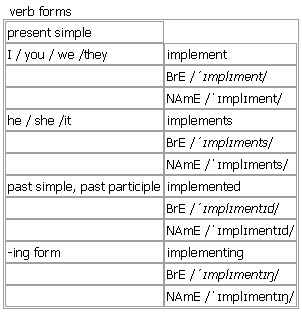 implement
implement
im·ple·ment AW [implement implements implemented implementing] verb, noun
verb BrE [ˈɪmplɪment] ; NAmE [ˈɪmplɪment] ~ sth (formal)
to make sth that has been officially decided start to happen or be used
Syn: carry out
•to implement changes/decisions/policies/reforms
•A new work programme for young people will be implemented.
Verb forms: 
Word Origin:
late Middle English (in the sense ‘article of furniture, equipment, or dress’): partly from medieval Latin implementa (plural), partly from late Latin implementum ‘filling up, fulfilment’, both from Latin implere ‘fill up’ (later ‘employ’), from in- ‘in’ + Latin plere ‘fill’. The verb dates from the early 18th cent.
Example Bank:
•It's a simple, easily implemented system.
•The decision was hard to implement.
•The decision will be difficult to implement.
•The government failed to implement the plan.
•The proposed changes were never actually implemented.
•These policies have never been fully implemented.
•These reforms have now been widely implemented in schools.
•a poorly implemented strategy
•The government gave assurances that it would implement the recommendations in full.
•We are implementing a new system of stock control.
•We have not yet begun to implement the changes.
Derived Word: ↑implementation
noun BrE [ˈɪmplɪmənt] ; NAmE [ˈɪmplɪmənt] (formal)
a tool or an instrument, often one that is quite simple and that is used outdoors
•agricultural implements
Word Origin:
late Middle English (in the sense ‘article of furniture, equipment, or dress’): partly from medieval Latin implementa (plural), partly from late Latin implementum ‘filling up, fulfilment’, both from Latin implere ‘fill up’ (later ‘employ’), from in- ‘in’ + Latin plere ‘fill’. The verb dates from the early 18th cent.
Example Bank:
•Make sure that all sharp implements, such as scythes, have covers.
•Various local crafts and agricultural implements are represented in the exhibition.
|
|
